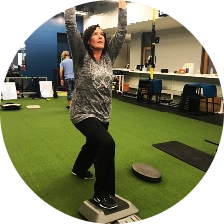Blog
Don’t Let Plantar Fasciitis Be Your Achilles’ Heel

TruMove Overland Park offers treatment and pain management for plantar fasciitis, foot pain and heel pain due to bone spurs, fracture, tendon tear by manual physical therapy, RockBlades, Dry Needling, and Blood Flow Restriction (BFR).
Read up for information regarding:
- Diagnosing Your Heel Pain / Foot Pain
- Causes of Plantar Fasciitis / Foot Pain / Heel Pain
- Symptoms of Plantar Fasciitis / Foot Pain / Heel Pain
Perhaps you are familiar with the Trojan War hero of Greek mythology, Achilles, a strong and seemingly invincible character. His only vulnerable spot was his heel and it led to his demise. Popular culture now uses “Achilles’ heel” to refer to our own weaknesses or vulnerabilities that may become our downfall. Similarly, while heel pain may seem relatively innocuous at its onset, if not properly addressed, it can easily escalate into a very painful and even debilitating condition. If you are experiencing heel pain, please do not ignore it. Seek treatment to avoid progressing symptoms and/or chronic pain. Limping is not a solution. In fact, the improper alteration to your walk can lead to other foot, knee, hip and back pain.
Diagnosing Your Heel Pain / Foot Pain
The plantar fascia is a think band of tissue that connects the heel to the ball of the foot and your toes, supporting the arch. If the tissue becomes inflamed, a condition known as plantar fasciitis develops. Plantar fasciitis is one of the most common causes of heel pain. Those over the age of 40 are at a higher risk, particularly if they have jobs or hobbies that require them to be on their feet for prolonged periods of time. Factory workers, teachers, waiters/waitresses and others who spend most of their work hours standing or walking on hard surfaces may damage the plantar fascia, especially if they do not wear shoes with adequate support.
Plantar fasciitis / foot pain / heel pain is also common among runners, especially those who rapidly increase the distance and/or frequency of their runs. Risk also increases for individuals who are overweight, who have low calf muscle mobility, and who have flat-foot tendencies. If walking barefoot or in flip-flops is your preference, your risk for developing plantar fasciitis / foot pain / heel pain increases.
Unless your heel pain is the result of bone spurs, a fracture, or a complete tendon tear, typically surgery can be avoided. Steroid injections are not recommended because while they may provide some temporary pain relief, they do not address the cause and can actually have an adverse effect, causing a weakening of the plantar fascia and increasing the likelihood of a rupture. Therefore, before scouring the Kansas City area for a surgeon or a foot specialist, physical therapy is a recommended and effective Plan A. The physical therapists here at TruMove in Overland Park, KS are movement specialists, treating and guiding you on your road to recovery while equipping you with knowledge, stretches, activities and movement adjustments to prevent further injury.
Causes of Plantar Fasciitis / Foot Pain / Heel Pain
Before we treat the symptoms, we need to search for the cause. We have touched on some of the risk factors that increase the likelihood of developing plantar fasciitis / foot pain / heel pain, but what exactly is happening when plantar fasciitis / foot pain / heel pain occurs? As previously mentioned, the plantar fascia is a shock-absorbing band of tissue that supports the arch in your foot. If the tension and stress on that tissue becomes too great, small tears may occur. If over-stretching and overuse occurs repeatedly, the fascia becomes irritated and/or inflamed resulting in plantar fasciitis / foot pain / heel pain.
Activities that place a lot of added stress on the heel and attached tissue include long-distance running, jumping, ballet dancing, and aerobic dance. Individuals with high arches or flat-footedness may walk with an altered stride and therefore may have weight distributed atypically increasing the stress on the plantar fascia. Added stress on the tissue also systematically occurs with increased body weight. Time is a factor, too—if you’re up on your feet for prolonged periods without breaks or appropriate shoe cushion, plantar fasciitis / foot pain / heel pain may develop.
Symptoms of Plantar Fasciitis / Foot Pain / Heel Pain
Heel pain, swelling, throbbing, stiffness, weakness and instability of the ankle are all symptoms of plantar fasciitis / foot pain / heel pain. plantar fasciitis / foot pain / heel pain pain can present at the heel, along the arch, or at the ball of the foot. The stabbing pain typically occurs when weight is put on the foot. Thus, the first few steps after getting out of bed in the morning may be extremely painful. The discomfort may also be triggered by prolonged periods of standing or trying to stand after sitting for a long time. In addition, plantar fasciitis / foot pain / heel pain can make load-bearing activities such as running and climbing stairs very difficult.
As the body warms up, plantar fasciitis / foot pain / heel pain pain may actually decrease during the day, but it may begin to flare up again by day’s end. Tight, stiff muscles in the lower leg will put more tension on the plantar fascia creating more irritation and pain, while muscles that are warmed up will reduce stress on the inflamed tissue. Therefore, for plantar fasciitis / foot pain / heel pain sufferers who continue to exercise in moderation, the pain is often less during workouts then escalates after.
Plantar Fasciitis / Foot Pain / Heel Pain Treatment & Prevention
Research has found that patients who receive manual therapy as part of their physical therapy treatment require fewer visits and have an overall lower cost of care. Thus, while stretching and exercising to increase strength and mobility in the plantar fascia, Achilles tendon, and lower leg muscles are certainly important, manual therapy is also of great value in reducing the pain and length of recovery for plantar fasciitis / foot pain / heel pain sufferers. TruMove physical therapists also use RockBlades, Dry Needling, and Blood Flow Restriction (BFR) to treat plantar fasciitis / foot pain / heel pain patients, effectively reducing their pain and speeding their recovery.
Don’t let plantar fasciitis / foot pain / heel pain be your Achilles’ heel—take measures to prevent it. If your job or hobbies require you to be on your feet, wear shoes with proper support and stand on “anti-fatigue” floor mats when possible. Be sure to warm up before you exercise. Don’t make sudden drastic increases in the intensity and/or duration of your activities but instead take a gradual build-up approach. Maintaining a healthy body weight and ankle mobility will also help prevent plantar fasciitis / foot pain / heel pain.
If you have any questions about your plantar fasciitis / foot pain / heel pain symptoms, available treatments, or how to prevent future injury, please reach out to us or visit our clinic in Overland Park, KS. We have been serving the Kansas City area for over a decade and continue to expand our outreach, always striving for Better Health Through Motion!













